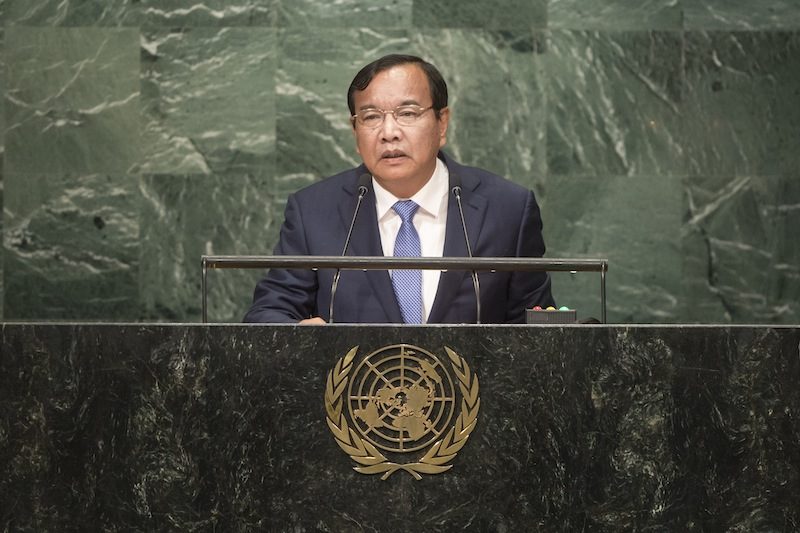Foreign Minister Prak Sokhonn defended the government before the U.N. General Assembly in New York on Saturday, saying that the ruling party was being held to unrealistic expectations of a “perfect democracy” while the opposition was “committing very serious crimes.”
Delivering his first major address to the U.N., the new foreign minister was the latest government official to hit back at claims that the CPP is attempting to cripple the opposition and other critics ahead of local elections next year and national elections in 2018.

“International institutions and Western parliamentarians have pointed the finger sometimes and tried to lay blame. I am here before you not as an accused party; I am speaking to you as a country that is often judged negatively, and even more often it is misunderstood and not recognized, particularly in the Western world,” he said.
“In the West, some NGOs, some media and some governments often describe our weaknesses as crimes of the state,” Mr. Sokhonn said, lamenting the democratic standards outlined in the 1991 Paris Peace Agreements.
“With the Paris Agreements, we have been asked to accept a perfect model of democracy, and this does not take into account the fact that some other countries have a different approach. We often find ourselves in a situation in which our opposition is committing very serious crimes,” he said.
Both opposition leader Sam Rainsy and his deputy, Kem Sokha, have been effectively sidelined by what are widely seen as politically motivated court cases. Mr. Rainsy is living in France to avoid jail, while Mr. Sokha has been living in the CNRP’s headquarters in Phnom Penh to evade arrest.
Earlier this month, 36 countries issued a statement during a U.N. Human Rights Council session raising deep concern “about the current escalation of political tensions in Cambodia, which threatens legitimate activities by opposition parties and human rights NGOs.”
Ney Sam Ol, Cambodia’s ambassador to the U.N., responded with a statement saying that the concerns were based on a false picture presented by “some political parties and entities,” adding “we do not welcome interference in our political situation.”
Nicolas Agostini, the International Federation for Human Rights’ representative to the U.N., said Cambodia’s defense against international criticism was starting to sound increasingly similar to China, now its largest foreign benefactor.
“Cambodia’s response to international criticism has increasingly been based on a rejection of ‘interference,’ ‘double standards’ and ‘politicization.’ These are hallmarks of China’s diplomatic discourse. In that sense, we can talk of a Sinicization of the CPP’s international discourse,” Mr. Agostini said by email.
“There is nothing specifically Cambodian, or Asian, to the CPP’s flawed approach to democracy. What we are witnessing is simply what autocrats do the world over: harassing the opposition, jailing independent voices, and trying to intimidate society as a whole, including with a threat to use violence, in order to hold on to power.”
Phil Robertson, deputy Asia director for Human Rights Watch, also said that the government’s rejection of Western opinion could be seen as leaning toward Beijing.
“As the Cambodia government intensifies its crackdown on the NGOs and the political opposition, the government is working hard to persuade governments, and particularly donors, to stay on the sidelines by claiming some sort of mythical ‘silent majority’ of states support them in this,” Mr. Robertson said by email.
“This is partly bluff, and partly a look towards China as an ally that doesn’t care how much Cambodia violates human rights,” he added.
“What we are hearing from foreign governments is first, a lot of serious concerns about how to reverse the rapidly worsening rights situation, but then second, a sense of desperation on what to do because the Cambodian government refuses to listen to criticism expressed either publicly or privately.”
Government spokesman Phay Siphan said criticism coming from the Western world was simply down to cultural differences.
“Our democracy is based on our Constitution. If anyone doesn’t like it, file a complaint with the courts or Constitutional Council,” Mr. Siphan said.
“Our democracy is completely different from your country’s democracy,” he added. “We eat rice and you eat hamburgers.”